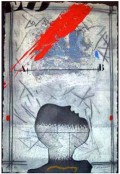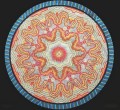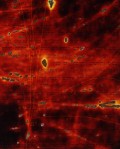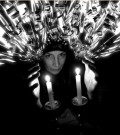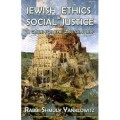Faith and Practice
Why this Fast of Esther, I'm Fasting for Immigration Reform (Hint: I'm an Observant Jewish Woman. And an Immigrant.)
As an observant Jew, I, along with so many people in the Jewish community will spend today fasting and reflectingon the bravery of Queen Esther and the Jews in the Persian Empire. At that time, they gathered to fast and to pray in order to spare the Jewish people from extermination. There are seven fast days every year. But today’s fast feels different. On this day, women from across the Jewish spectrum are fasting and raising awareness to speak truth to power to achieve just, humane, and comprehensive immigration reform. As a Jew, as a woman and as an immigrant from Canada, I identify with the gravity of the mission of the day.
Choices and Change: How I Became a Social Justice Rabbi
I didn’t set out to become a social justice rabbi. I didn’t grow up in an activist family or do a lot of community service in high school, and my Judaism is not all about tikkun olam.
“I’m looking for an internship in lobbying,” I said to my high school guidance counselor toward the end of junior year.
“Ok. Lobbying for whom?”
“I don’t care — could be the NRA, could be Planned Parenthood. I just want to learn how this lobbying thing works.”
A Time for Righteous Rage (Not Macho Anger): Martin Luther King Jr & the Modern-Day Mishnaic Sage
Around this time every year we memorialize the Martin Luther King who was a peacemaker, a conciliator, a lover and not a hater. In reality, the Rev. Martin Luther King Jr was the master of the thunderous cadences of righteous rage. The Jewish community is rightfully proud of the picture of Abraham Joshua Heschel marching with Martin Luther King and thousands of others into and through the forces of evil in Selma, Alabama.
We must, however, ask ourselves: “What have we done to earn that legacy?”
Tu B’Shvat Reflections on Parenthood, Extreme Weather, and the Human Family Tree
What does Tu B’Shvat mean when life on our planet feels so palpably fragile, asks Rabbi Rachel Barenblat. Her answer? We who are blessed with good soil and healthy roots have an obligation to send sustenance to those on the thin, treacherous margins.
Religion and Hybridity: Can someone be Jewish and Christian?
We can’t deny people what they have already taken for themselves: the ability to create identities that are satisfying and meaningful. American religious identities are fuzzy around the edges. The change is already here.
(This piece, from the Zeek archive, originally ran in May 2011.)
Barely Time to Wait: Could the Grateful Dead Be Part of the Response to the Pew Study?
It was in the dining hall of the Isabella Freedman Jewish Retreat Center just over two years ago when the light bulb appeared above my head. Our program director, Adam Segulah Sher, was welcoming participants for a weeklong retreat focused on serving on a chevra kadisha, a community’s secret burial society. “Welcome to this special week where we join together to learn how to honor the dead.” And there it appeared. Yes, we have a retreat focused on honoring the dead, but how about a retreat focused on honoring The Dead? A Shabbaton built upon dedication to the Grateful Dead, the legendary rock band.
From the beginning, it was something more than a joke.
Progress from Process
“Will we pause long enough to look at the objects we possess and see that what we think of as ‘process’ is actually a chain of human beings? If not, then we participate in a criminal act of willful forgetting,” writes Rabbi Menachem Creditor. This Chanukah, let’s shine a light on modern-day slavery and ensure our choices support freedom.
Kol Nidre and the Real Work of Personal Change
I begin each day of my life with a ritual. I wake up at 5:30 am, put on my workout clothes, my leg warmers, my sweatshirt and a hat. I walk outside my Manhattan home, hail a taxi, and tell the driver to take me to the Pumping Iron gym at 91st street and 1st avenue, where I work out for 2 hours. The ritual is not the stretching and weight training I put my body through each morning at the gym; the ritual is the cab. The moment I tell the driver where to go, I have completed the ritual. —Twyla Tharp, “The Creative Habit”
Why do we recite Kol Nidre on Yom Kippur night? The exact history of this prayer is a little vague, but what is clear is that this prayer is not a prayer at all: the Aramaic text, dating from at least the ninth century, is a legal formulation for the annulment of vows. It doesn’t mention the themes of the season: forgiveness, teshuva, renewal. It does not mention God. Unrelated in its content to the rest of the Yom Kippur liturgy, it seems at first blush to be a strange way to start a 25-hour period of intense introspection and self-reflection.
Part of Kol Nidre’s rhetorical power comes from its repetitive language: READ MORE
Praying With Our Lips: Another Side of Heschel’s Legacy
“Social justice activists of all religious and spiritual stripes,” writes Shuli Passow, “have something to learn from what Heschel understood as the power and practice of praying — not with one’s feet, but with one’s mouth, lips, and words.”
A Critical Time for Jewish Youth: Rethinking the Bar and Bat Mitzvah
Tweens need more. A look at one approach to making Judaism relevant, meaningful and transformative and giving youth a Jewish compass to navigate their lives ahead. Naturally.
Why I Am Not Modern Orthodox
Some time ago, I met a man named Avremel. Avremel was a Satmar Hasid, and when I told him that I too was once Hasidic but am now no longer religious, he did not know what to make of it.
“What do you mean, you are no longer religious?” he asked, shaking his head as if it was all some newfangled bit of nonsense, like naked yoga or a juice fast.
We had met at the Chulent, an underground weekly event in New York City for the non-conformist among the Orthodox: Hippie ex-Hasids mingling with weed-smoking, Lakewood yeshiva guys; Breslov Na-nach-nikim chatting up artsy young women from Borough Park or Monsey.
Exult! Rejoice! Wait, Who’s Bedding Whom? Listening to Leviticus post-DOMA
AuthorsThe Supreme Court’s ruling on DOMA means that the remaining voices of bias and hate in the conversation are primarily religious ones. This is nothing less than a crisis, writes Rabbi Michael Rothbaum, for anyone who believes that religion remains a prophetic voice for justice. It’s time to look more closely at Leviticus.
Being Meir
Can spiritual growth be found in the “tension between one’s own cherished beliefs and someone else’s contradictory beliefs”? Absolutely.
Families, Holy and... there is no other kind: A Jewish Ayahuasca Journey
I saw, behind my father, his father, and his father, and his. I saw, behind him and to his left, his mother, and her parents, and hers. Stretching backward in time, I saw generations of my ancestors, not in any particular detail, but like a phalanx of men and women supporting me and holding me. And then, above and behind my father, I had a vision of something that felt like the God of our ancestors, of Abraham, Isaac, and Jacob
Hearing the Healers
“Healing” is an abstract word, but the experiences we have as healers are concrete and specific. Here, read the voices of three people engaged in the healing process: a military chaplain, a hospice volunteer, and a social worker experiencing her own grief.
Chevra Kaddisha: The Jewish Burial Society
They call me at 8:54 a.m.
“Yes, it would be an honor. Be there in twenty.” I hang up, wring my hands together twice, pull back my hair. I’ve only seen a dead body once before. It was fresh, recently deceased.
Kabbalah for the Masses: Re-considering the Elitism of Medieval Jewish Mysticism
The perception of medieval Kabbalah as a carefully guarded, secret discourse is the result of an overemphasis on the claims of some of the early kabbalists, as well as a narrow selection of texts that have received disproportionate attention due to their prominence in later centuries. In fact, many medieval kabbalistic texts reflect an explicit desire to introduce Kabbalah to readers who are just beginning to study Jewish esoteric lore.
Chava Weissler: Tradition and Renewal
Rachel Barenblat speaks with Chava Weissler, writer, scholar, and folklorist, about Jewish spirituality, the blurry boundaries of a participant-observer, and the Jewish life of “non-elites.”
Mandalas at the Mikveh
There is a strong tradition of writing intentions for mikveh immersion. Why not write one’s intention not merely in words, but in the form of a mandala or Shiviti? And so I found myself one winter evening with a circle of women around a table with a single candle, drawing paper, and various drawing and painting implements.
Why Liberal Jews Should Read an Orthodox Social Justice Book
Rabbi Shmuly Yanklowitz’s new book, Jewish Ethics and Social Justice is a must-read for Orthodox Jews interested in social justice. Unfortunately, there aren’t many of them — yet. But liberal Jews should read it too.
![[the current issue of ZEEK]](../../../image/2/100/0/5/uploads/leftistethicistgraphic-52842c6a.png)
- 5000 Pages of Zeek
- Founded in 2001, Zeek was the first Jewish online magazine, and we have over 5000 pages online to prove it, all available free of charge. Read more in the Archive.





